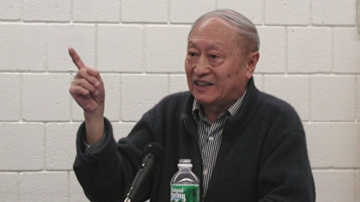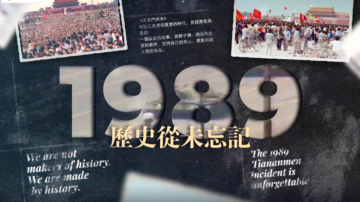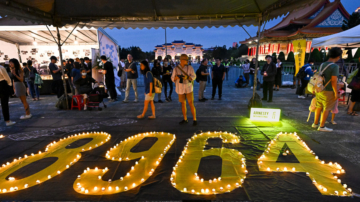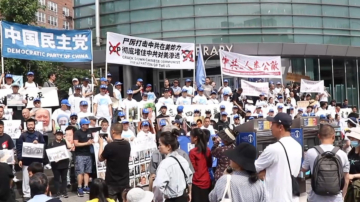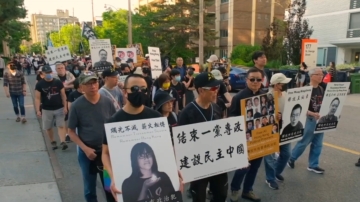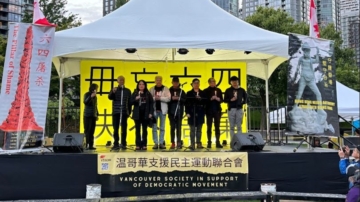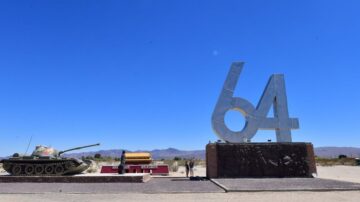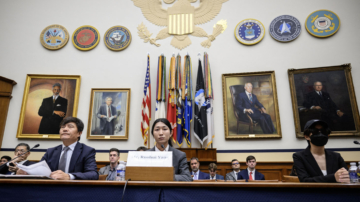【新唐人2014年05月09日訊】泰國最高法院日前宣佈:罷免總理英拉。在此之前,支持英拉的泰國民眾,已在首都曼谷進行了6個月的公開抗議活動。同樣是最高領導人,同樣受到民眾的支持,但前中共中央總書記胡耀邦和趙紫陽,卻是在黨內的政治鬥爭中被整下臺,支持他們的民眾還受到鎮壓。
泰國最高法院5月7號以違憲和濫用職權的罪名,要求總理英拉必須辭職。
對英拉提出指控的是部分反對派參議員,他們指控英拉2011年調任當時的國家安全首腦的作法,違反憲法,是為她所屬的泰黨謀利。英拉還可能面臨進一步的法庭指控。目前還不清楚裁決日期。
支持英拉的「紅衫軍」計劃這個週六在曼谷郊區舉行示威。
同樣受民眾支持的前中共中央總書記胡耀邦和趙紫陽,他們又是如何下臺的?
東南大學法學教授張讚寧:「中國這個專制體制跟世界民主體制最根本的區別,就是我們的憲法是一個擺設。民主國家最高領導人的罷免只能通過彈劾程序,但是我們的《憲法》在《宣言》裡面就明文規定:黨是領導一切的。總書記實際是掌控在背後的那些大佬們的手上。」
1986年年底至1987年初,中國各地爆發大規模學生運動,17個大中城市,爆發聲勢浩大的示威遊行,「要民主,要自由,要人權,反官倒,反腐敗」的口號聲,震驚中南海。當時中共元老們將學潮的爆發,歸咎於自由化知識份子的煽動,以及時任中央總書記胡耀邦的縱容。
胡耀邦在「黨內生活會」上,被退休的中共元老和一些年輕的高級領導人輪流批評,沒有經過中共全會,胡耀邦就完成了辭職程序。不久後他因急性心肌梗塞而過世。
胡耀邦逝世後,青年學生紛紛出來悼念,以至引發後來的學生與民間的聯合運動,並導致著名的「六四事件」發生。
中國南京律師,「東南大學」法學教授張讚寧表示,如果中共的總書記有一些想法違反了黨內的潛規則,甚至還沒有開始做,黨內的大佬們就會想辦法逼迫他下臺,而不通過任何法律程序。
張讚寧:「據我了解,胡耀邦的下臺其實真正的原因,他准許了公安部門進中南海去抄胡喬木家。中南海的那些大佬們人人都感到自危。那麽罷免趙紫陽,真正的原因是趙紫陽已經作出了一個決定,準備公布中南海那些大佬們的個人財產,所以就把他弄下去。」
1989年「六四屠殺」後,中共大佬們主導召開了以批判趙紫陽為主的政治局擴大會議,隨後撤銷了趙紫陽中共中央總書記等職務,並把他軟禁到死。
大陸民主人士王藏:「其實中國不存在法律,所以中共政權的領導人以及地方官吏的下臺與否,只是政治鬥爭,與法律、法制沒有絲毫的關係。當時鄧小平把趙紫陽弄下去,其實這就是文革的延續,根本原因是中共一黨專制暴政。」
張讚寧:「我們搞改革已經搞了30多年,但是始終沒有觸及到一些政治上的根本問題,甚至連黨政分開這麽一個最簡單,也是歷代領導人曾經都提到過想改革的一個問題,都一直沒有實質性的進展。他們不管誰上臺都是要維護黨的領導。」
大陸民主人士王藏指出,中共這樣一個腐敗的權貴利益集團,有甚麽資格去反腐敗?他們要是反腐敗,就是在反自己。
王藏:「所有這麽多年以來的口號——改革、改良都是忽悠,沒有任何出路。他們不存在任何改革,沒有任何希望。真正的改革應該落實到政治體制改革,必須是民主制度,這才叫真正改革。」
大陸政論作家杜導斌接受《新唐人》書面採訪時表示:泰國已經進入了君主立憲的體制,總理是民選領導人,如違憲可通過法製程序下臺。大陸是一黨執政的體制,對黨的最高領導人,只能通過變相的「宮廷政變」的方式被整下臺。這些被整下臺的最高領導人,通常並非違憲,主要是內鬥中落了下風。
採訪編輯/唐音 後製/陳建銘
Thai Law is Substantive vs Chinese Law is Decoration
The Supreme Court of Thailand recently announced
the removal of Prime Minister Yingluck from her office.
Prior to this, Yingluck's supporters had carried out protests
for six months in Bangkok, the capital of Thailand.
As supreme leaders who were supported by the people,
Chinese Communist Party (CCP) former General Secretaries
Hu Yaobang and Zhao Ziyang
were also removed from their positions due to political struggles
within the party and their supporters suffered repression.
On May 7, the Supreme Court of Thailand ordered the
removal from office of Prime Minister Yingluck on the
charges of violation of law and abuse of power.
The allegations came from some opposition senators,
who complained that Yingluck's change of National Security
leader in 2011 was unconstitutional
and was for the advantage of her Pheu Thai Party.
Yingluck may also face further court charges.
The date of the sentence is unclear.
The Red Shirt Army who supports Yingluck
plans to hold a demonstration in Bangkok on Saturday.
As supreme leaders who were supported by the people,
how were former CCP General Secretaries
Hu Yaobang and Zhao Ziyang forced to step down?
Southeastern University law professor Zhang Zanning:
"The most fundamental difference between China's dictatorship
and democracy is that our Constitution is only for decoration.
Leaders of democratic countries can only be dismissed
through the impeachment process.
But in our Constitution, it says: the Party leads everything.
the CCP General Secretary is actually controlled by
those big folks behind the scene."
From the end of 1986 to early 1987, student movements
raised up throughout China in 17 large and medium cities.
Massive demonstrations happened requesting "Democracy,
Freedom, Human Rights, Anti-Official Profiteering
and Anti-Corruption."
It shocked the CCP compound at Zhongnanhai.CCP senior
veterans blamed student movements, liberal intellectuals
and the then General Secretary Hu Yaobang.
Hu Yaobang was criticized by each CCP senior veteran
and some young high-level officials at the "Party Life Meeting."
Without going through a CCP Plenary, Hu Yaobang
completed the resignation process.Shortly thereafter he died of
acute myocardial infarction.
After Hu Yaobang's death young students came out to mourn
him, causing the subsequent joint movement of students and
civilians and led to the famous "June 4th Incident."
Zhang Zanning expressed that if a CCP General Secretary
had some ideas in contrary to the CCP's unspoken rules,
CCP senior veterans would force him to step down
without any legal process before he even carried out
his ideas.
Zhang Zanning: "According to the information I have,
the real reason for Hu Yaobang's stepping down
was that he allowed the public security to search
Hu Qiaomu's home.
Zhong Nanhai's veterans were afraid.
The real reason for the dismissal of Zhao Ziyang was because
he decided to publish the assets of Zhong Nanhai veterans."
After the 1989 "Tiananmen Massacre," CCP senior officials
held an extended Politburo meeting to criticize Zhao Ziyang.
Subsequently they revoked Zhao's position such as the
CCP General Secretary and other duties and put him under
house arrest until his death.
Chinese human right activist Wang Zang: "In fact, the Chinese
do not have law.
The CCP leaders and local officials got removed
due to political struggle, not as the result of the law.
Deng Xiaoping's dismissal of Zhao Ziyang was
a continuation of the Cultural Revolution.
The fundamental reason is the one-party tyranny."
Zhang Zanning: "We have conducted reform for over 30 years.
But we have not touched upon the fundamental political issue.
There is not even any substantial progress on the simple
separation of the Party and Country,
which has always been an issue the leaders want reformed.
No matter who is in power, they need to maintain the
CCP leadership."
Wang Zang questioned whether the CCP is qualified for
anti-corruption being such a corrupt elite interests group.
That would be against themselves.
Wang Zang: "The slogans all these years such as
reform and improvement are merely a show.
There is no way out. They do not do any reform.
There is no hope.A real reform should be implemented
on the political system.
We must implement a democratic system.
That is a real reform."
Political writer Du Daobin told NTD during an interview:
Thailand has a constitutional monarchy system.
The Prime Minister is an elected leader
and should step down for unconstitutional deeds.
China has a one-party system. The party's top leaders could
be kicked out by a "palace coup."
These top leaders stepped down mainly due to
failure of internal struggles, rather than for
unconstitutional deeds.
Interview & Edit/Tang Yin Post-Production/Chen Jianming
泰國最高法院5月7號以違憲和濫用職權的罪名,要求總理英拉必須辭職。
對英拉提出指控的是部分反對派參議員,他們指控英拉2011年調任當時的國家安全首腦的作法,違反憲法,是為她所屬的泰黨謀利。英拉還可能面臨進一步的法庭指控。目前還不清楚裁決日期。
支持英拉的「紅衫軍」計劃這個週六在曼谷郊區舉行示威。
同樣受民眾支持的前中共中央總書記胡耀邦和趙紫陽,他們又是如何下臺的?
東南大學法學教授張讚寧:「中國這個專制體制跟世界民主體制最根本的區別,就是我們的憲法是一個擺設。民主國家最高領導人的罷免只能通過彈劾程序,但是我們的《憲法》在《宣言》裡面就明文規定:黨是領導一切的。總書記實際是掌控在背後的那些大佬們的手上。」
1986年年底至1987年初,中國各地爆發大規模學生運動,17個大中城市,爆發聲勢浩大的示威遊行,「要民主,要自由,要人權,反官倒,反腐敗」的口號聲,震驚中南海。當時中共元老們將學潮的爆發,歸咎於自由化知識份子的煽動,以及時任中央總書記胡耀邦的縱容。
胡耀邦在「黨內生活會」上,被退休的中共元老和一些年輕的高級領導人輪流批評,沒有經過中共全會,胡耀邦就完成了辭職程序。不久後他因急性心肌梗塞而過世。
胡耀邦逝世後,青年學生紛紛出來悼念,以至引發後來的學生與民間的聯合運動,並導致著名的「六四事件」發生。
中國南京律師,「東南大學」法學教授張讚寧表示,如果中共的總書記有一些想法違反了黨內的潛規則,甚至還沒有開始做,黨內的大佬們就會想辦法逼迫他下臺,而不通過任何法律程序。
張讚寧:「據我了解,胡耀邦的下臺其實真正的原因,他准許了公安部門進中南海去抄胡喬木家。中南海的那些大佬們人人都感到自危。那麽罷免趙紫陽,真正的原因是趙紫陽已經作出了一個決定,準備公布中南海那些大佬們的個人財產,所以就把他弄下去。」
1989年「六四屠殺」後,中共大佬們主導召開了以批判趙紫陽為主的政治局擴大會議,隨後撤銷了趙紫陽中共中央總書記等職務,並把他軟禁到死。
大陸民主人士王藏:「其實中國不存在法律,所以中共政權的領導人以及地方官吏的下臺與否,只是政治鬥爭,與法律、法制沒有絲毫的關係。當時鄧小平把趙紫陽弄下去,其實這就是文革的延續,根本原因是中共一黨專制暴政。」
張讚寧:「我們搞改革已經搞了30多年,但是始終沒有觸及到一些政治上的根本問題,甚至連黨政分開這麽一個最簡單,也是歷代領導人曾經都提到過想改革的一個問題,都一直沒有實質性的進展。他們不管誰上臺都是要維護黨的領導。」
大陸民主人士王藏指出,中共這樣一個腐敗的權貴利益集團,有甚麽資格去反腐敗?他們要是反腐敗,就是在反自己。
王藏:「所有這麽多年以來的口號——改革、改良都是忽悠,沒有任何出路。他們不存在任何改革,沒有任何希望。真正的改革應該落實到政治體制改革,必須是民主制度,這才叫真正改革。」
大陸政論作家杜導斌接受《新唐人》書面採訪時表示:泰國已經進入了君主立憲的體制,總理是民選領導人,如違憲可通過法製程序下臺。大陸是一黨執政的體制,對黨的最高領導人,只能通過變相的「宮廷政變」的方式被整下臺。這些被整下臺的最高領導人,通常並非違憲,主要是內鬥中落了下風。
採訪編輯/唐音 後製/陳建銘
Thai Law is Substantive vs Chinese Law is Decoration
The Supreme Court of Thailand recently announced
the removal of Prime Minister Yingluck from her office.
Prior to this, Yingluck's supporters had carried out protests
for six months in Bangkok, the capital of Thailand.
As supreme leaders who were supported by the people,
Chinese Communist Party (CCP) former General Secretaries
Hu Yaobang and Zhao Ziyang
were also removed from their positions due to political struggles
within the party and their supporters suffered repression.
On May 7, the Supreme Court of Thailand ordered the
removal from office of Prime Minister Yingluck on the
charges of violation of law and abuse of power.
The allegations came from some opposition senators,
who complained that Yingluck's change of National Security
leader in 2011 was unconstitutional
and was for the advantage of her Pheu Thai Party.
Yingluck may also face further court charges.
The date of the sentence is unclear.
The Red Shirt Army who supports Yingluck
plans to hold a demonstration in Bangkok on Saturday.
As supreme leaders who were supported by the people,
how were former CCP General Secretaries
Hu Yaobang and Zhao Ziyang forced to step down?
Southeastern University law professor Zhang Zanning:
"The most fundamental difference between China's dictatorship
and democracy is that our Constitution is only for decoration.
Leaders of democratic countries can only be dismissed
through the impeachment process.
But in our Constitution, it says: the Party leads everything.
the CCP General Secretary is actually controlled by
those big folks behind the scene."
From the end of 1986 to early 1987, student movements
raised up throughout China in 17 large and medium cities.
Massive demonstrations happened requesting "Democracy,
Freedom, Human Rights, Anti-Official Profiteering
and Anti-Corruption."
It shocked the CCP compound at Zhongnanhai.CCP senior
veterans blamed student movements, liberal intellectuals
and the then General Secretary Hu Yaobang.
Hu Yaobang was criticized by each CCP senior veteran
and some young high-level officials at the "Party Life Meeting."
Without going through a CCP Plenary, Hu Yaobang
completed the resignation process.Shortly thereafter he died of
acute myocardial infarction.
After Hu Yaobang's death young students came out to mourn
him, causing the subsequent joint movement of students and
civilians and led to the famous "June 4th Incident."
Zhang Zanning expressed that if a CCP General Secretary
had some ideas in contrary to the CCP's unspoken rules,
CCP senior veterans would force him to step down
without any legal process before he even carried out
his ideas.
Zhang Zanning: "According to the information I have,
the real reason for Hu Yaobang's stepping down
was that he allowed the public security to search
Hu Qiaomu's home.
Zhong Nanhai's veterans were afraid.
The real reason for the dismissal of Zhao Ziyang was because
he decided to publish the assets of Zhong Nanhai veterans."
After the 1989 "Tiananmen Massacre," CCP senior officials
held an extended Politburo meeting to criticize Zhao Ziyang.
Subsequently they revoked Zhao's position such as the
CCP General Secretary and other duties and put him under
house arrest until his death.
Chinese human right activist Wang Zang: "In fact, the Chinese
do not have law.
The CCP leaders and local officials got removed
due to political struggle, not as the result of the law.
Deng Xiaoping's dismissal of Zhao Ziyang was
a continuation of the Cultural Revolution.
The fundamental reason is the one-party tyranny."
Zhang Zanning: "We have conducted reform for over 30 years.
But we have not touched upon the fundamental political issue.
There is not even any substantial progress on the simple
separation of the Party and Country,
which has always been an issue the leaders want reformed.
No matter who is in power, they need to maintain the
CCP leadership."
Wang Zang questioned whether the CCP is qualified for
anti-corruption being such a corrupt elite interests group.
That would be against themselves.
Wang Zang: "The slogans all these years such as
reform and improvement are merely a show.
There is no way out. They do not do any reform.
There is no hope.A real reform should be implemented
on the political system.
We must implement a democratic system.
That is a real reform."
Political writer Du Daobin told NTD during an interview:
Thailand has a constitutional monarchy system.
The Prime Minister is an elected leader
and should step down for unconstitutional deeds.
China has a one-party system. The party's top leaders could
be kicked out by a "palace coup."
These top leaders stepped down mainly due to
failure of internal struggles, rather than for
unconstitutional deeds.
Interview & Edit/Tang Yin Post-Production/Chen Jianming

